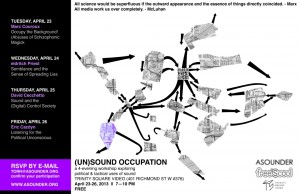Here are the details for an upcoming event that features members of The Occulture:
Asounder and the Free’scool are inviting you to participate in a series of workshops—(un)sound occupation—to be held over 4 evenings, April 23-26 at Trinity Square Video, whose space has been generously donated for the duration of the event.
These workshops are intended to bring together the realms of sound and politics—deeply linked but rarely examined together—in order to begin developing a shared language and a tactical agenda for the immediate future. Activists, students, sound practitioners, musicians, political, social, cultural theorists, philosophers (among others) are all invited to add their voices to the first edition of what we hope will become an ongoing series. Marc Couroux (York), David Cecchetto (OCAD/York), eldritch Priest (OCAD/York) and Eric Cazdyn (U of T) will lead the sessions, each according to a particular theme.
Marshall McLuhan once stated that the artist was the only individual who could face the present, able to recognize the otherwise imperceptible patterns at work within new technological environments. It’s not so clear whether this is still the case today. The revolutionary potential of art has suffered greatly over the past 40 years, in many ways struggling to keep up with the constant acceleration of capitalism and its hunger to absorb and neutralize resistant practices. Even in the wake of the devastating financial crisis of 2008, which appeared to spell the beginning of the end for capitalism, the role(s) the artist can play in fostering social change continue to be clouded by a mess of factors: professionalization (competition/market), corporate absorption (the “creative class”), a hallucinatory overload of networked information which exceeds cognitive capacities, and the increasingly suspect function of art institutions in a neoliberal economy (among many others).
At the same time, overwhelming debt comes to determine the direction of one’s life, easily observed (for instance) in the daily struggles of the vulnerable young student, whose idealism (if it is even encouraged) must take a backseat to bare survival. We live in a world which can no longer sustain a life-trajectory with clearly definable goals and realizable dreams. Instead, we are forced to be flexible, moving from project to project, without continuity or long-term purpose. This flexibility makes it difficult to engage head on with the mechanisms of capitalism, as we are so deeply embedded within its logic that we can no longer see it operating. Only the short term seems to matter: Kafka’s “indefinite postponement” has become the norm. Both artists and activists are caught up in this chronic state, in which the end of capitalism and productive alternatives seem unthinkable.
We believe that sonic practice provides a viable set of models that can intervene in our current crisis. On the one hand, hearing is a deeply public sense with a capacity to unite individuals within a shared experience. (Think of the People’s Mic at Occupy gatherings, the waves of chants which contagiously spread at demonstrations, or the vibrational continuum of the rave.) On the other hand, because our ears are always open (like unsecured computer networks), they are vulnerable to invasion by corporate interests. Sonic branders are well aware of this and are devising increasingly tight strategies of emotional manipulation, bypassing the capacity for rational thought (and possible resistance). Sound is everywhere in our totally electrified contemporary world. Increasingly sophisticated audio technologies, in the hands of corporate predators, fragment consciousness by constantly soliciting our attention. Increasingly strong drugs are required to retain focus on a daily basis. In the absence of an awareness of these conditions, music and sound become insidious tools for the manipulation of mood and affect, in addition to delimiting the range of experiences that one can have.
How might sound be employed by artists and activists to hear a radically different future than the same old one the system keeps playing for us? What kinds of sonic tactics might be used in the context of a demonstration to galvanize a collective power eluding the authority of the state and corporate control? How might sound be used in conjunction with technologies that have a long association with forms of mind control? Can an analysis of the manners in which sound is employed in mass media offer future modes of intervention? Can zones of radical openness be conceptualized away from the feedback control and capture essential to capitalist power?
We are tremendously excited to be working with the Free’scool, a vibrant, popular education initiative which has been growing steadily over the past year (emerging out of the passionate struggles of Occupy TO), dedicated to closing the gap between knowledge and action. Their support for this project has been of inestimable value.
The workshop format allows for maximal interactivity. Unlike more formal contexts, it is geared towards working out problems in a non-hierarchical setting. The lion’s share of each evening will be dedicated to open dialogue, framed by a short presentation by each facilitator around current research and concerns. A number of questions relevant to each evening’s topic will be circulated in advance, in the hope that they will stimulate other questions intimately related to the everyday life of each participant. Indeed, we intend these to catalyze trains of thought which will feed into an evolving process, bridging speculation, analysis as well as pragmatic, tactical action. In addition, a number of relevant readings from a wide variety of sources will also provide the opportunity for a deeper consideration of the issues at hand. We hope to turn the workshop proceedings into a pamphlet-style publication for wider distribution and to stimulate other communities into taking up some of the questions we will be brainstorming.
In order to gain a sense of the number of participants involved, please RSVP to torn@asounder.org to confirm your presence.

